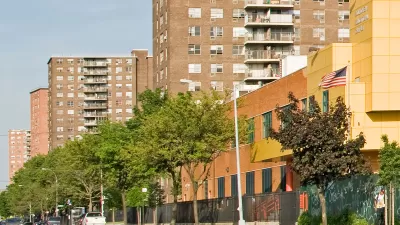Created to speed investment in struggling communities, the federal Opportunity Zones program could also spur research into how capital can be better deployed on a district-by-district basis.

A product of the GOP's 2017 tax reform bill, the federal Opportunity Zones program proposes to aid "struggling communities" (though there's been some debate on that score) by enabling greater redevelopment investment in specific census tracts. Here, Bruce Katz discusses why the program could spark more comprehensive research into how specific investments impact and interact with their wider environs.
Katz points to some of the common designations for urban districts: central business districts, anchor districts, residential areas, and the like. "For urban officials, practitioners, researchers or residents themselves, these archetypes are so settled that they rarely elicit discussion or debate. Yet the Opportunity Zone tax incentive enables us to think about each of these distinct areas as possible asset classes or investment sectors."
The Opportunity Zone framework, Katz says, is one way to see past the compartmentalization of urban finance. "At a minimum, the creation of Zone typologies could help motivate major institutions within different kinds of Opportunity Zones to consider how to realize their full economic impact."
See also: New Scrutiny for the Federal 'Opportunity Zones' Program
FULL STORY: Rethinking Capital and Geography

Alabama: Trump Terminates Settlements for Black Communities Harmed By Raw Sewage
Trump deemed the landmark civil rights agreement “illegal DEI and environmental justice policy.”

Planetizen Federal Action Tracker
A weekly monitor of how Trump’s orders and actions are impacting planners and planning in America.

The 120 Year Old Tiny Home Villages That Sheltered San Francisco’s Earthquake Refugees
More than a century ago, San Francisco mobilized to house thousands of residents displaced by the 1906 earthquake. Could their strategy offer a model for the present?

In Both Crashes and Crime, Public Transportation is Far Safer than Driving
Contrary to popular assumptions, public transportation has far lower crash and crime rates than automobile travel. For safer communities, improve and encourage transit travel.

Report: Zoning Reforms Should Complement Nashville’s Ambitious Transit Plan
Without reform, restrictive zoning codes will limit the impact of the city’s planned transit expansion and could exclude some of the residents who depend on transit the most.

Judge Orders Release of Frozen IRA, IIJA Funding
The decision is a victory for environmental groups who charged that freezing funds for critical infrastructure and disaster response programs caused “real and irreparable harm” to communities.
Urban Design for Planners 1: Software Tools
This six-course series explores essential urban design concepts using open source software and equips planners with the tools they need to participate fully in the urban design process.
Planning for Universal Design
Learn the tools for implementing Universal Design in planning regulations.
Clanton & Associates, Inc.
Jessamine County Fiscal Court
Institute for Housing and Urban Development Studies (IHS)
City of Grandview
Harvard GSD Executive Education
Toledo-Lucas County Plan Commissions
Salt Lake City
NYU Wagner Graduate School of Public Service





























